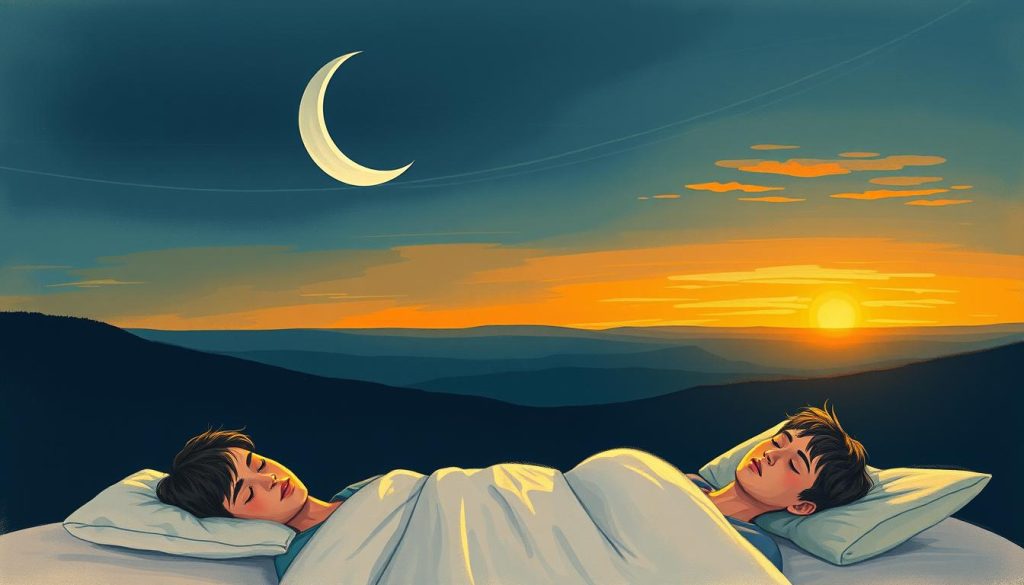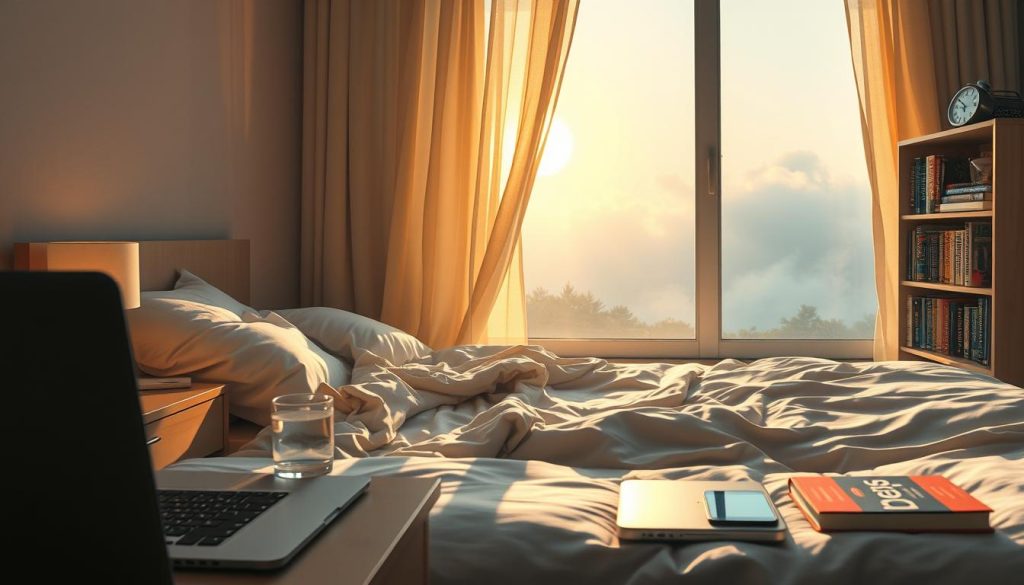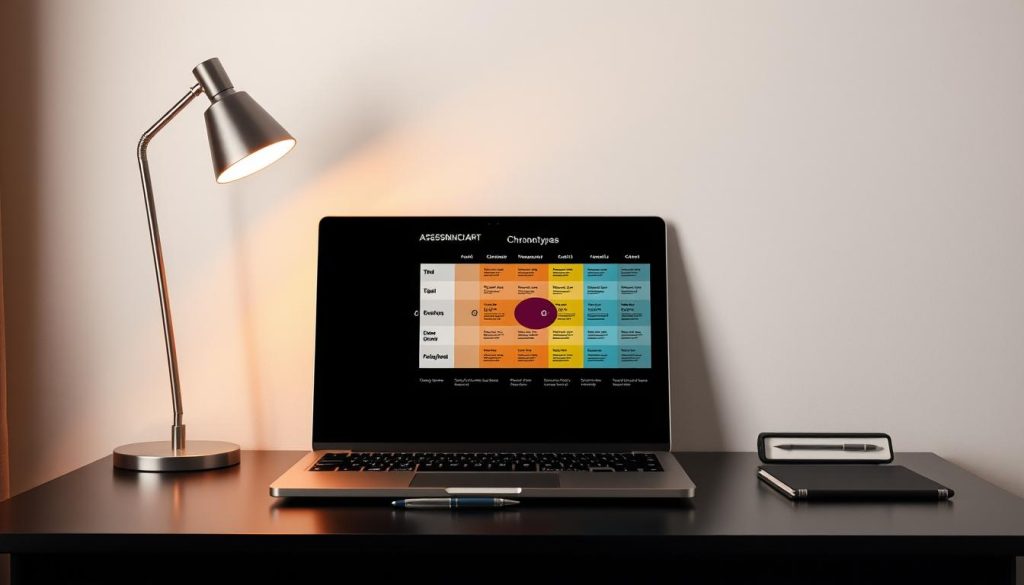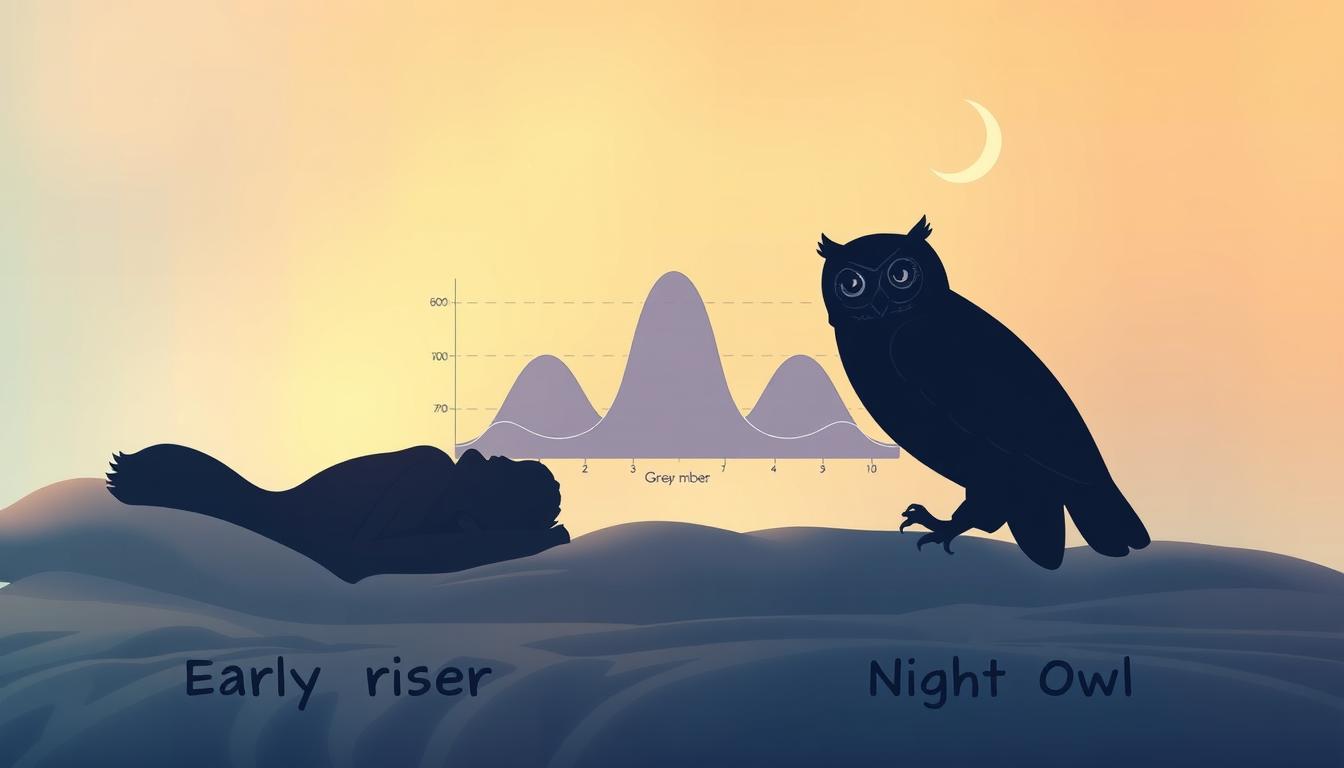Do you wake up early feeling refreshed and ready to go? Or do you hit the snooze button, not wanting to wake up? Your choice shows something interesting about your biology.
The debate between early risers and night owls is more than just a habit. It’s about your chronotype, your body’s natural sleep and wake times. This clock is deeper than you might think.
Your chronotype influences your energy and mood all day. Some people are most alert in the morning. Others shine at night.
Knowing your sleep-wake cycle can change your daily life. It helps you work with your body, not against it. This leads to better productivity, health, and happiness.
Ready to find out your true chronotype? Let’s see what science says about your natural sleep patterns.
Understanding the Concepts of Early Risers and Night Owls
Sleep chronotypes show how our bodies manage energy through the day. These patterns are not just habits. They are deeply rooted in our biology and genetics.
Your natural sleep-wake cycle affects your energy and thinking skills. Knowing if you’re a morning or evening person can help you live better. It can make you healthier and more productive.
What Makes Someone an Early Riser
A true morning person feels most alert in the early morning. They wake up feeling refreshed, often without needing an alarm. Their bodies make more cortisol in the morning, making them alert and ready to go.
Early risers usually have these traits:
- Wake up between 5:00 AM and 7:00 AM naturally
- Feel most productive during morning hours
- Experience energy decline in the evening
- Prefer going to bed between 9:00 PM and 11:00 PM
- Have difficulty staying alert during late-night activities
Studies show morning people have more cortisol in the morning. This helps them feel awake and focused at the start of their day.

Characteristics of a Night Owl
An evening person does best later in the day and night. Their body’s clock makes them most alert in the evening. Night owls find it hard to wake up early because their bodies aren’t made for it.
Common traits of night owls include:
- Natural bedtime between 11:00 PM and 2:00 AM
- Peak alertness occurs in the evening or night
- Difficulty waking up early without feeling groggy
- Higher energy levels during afternoon and evening
- Better cognitive performance in later hours
Evening people make more melatonin later in the evening. This hormone helps them sleep. It’s why they naturally stay up later.
The Biological Science of Sleep Patterns
Your circadian rhythms control more than sleepiness. They manage hormone production, body temperature, and digestion. The suprachiasmatic nucleus in your brain is the master clock, coordinating these processes.
Several factors influence your chronotype:
- Genetics play a significant role in determining your natural sleep pattern
- Age affects chronotype, with teenagers naturally shifting toward night owl patterns
- Light exposure helps synchronize your internal clock with the environment
- Lifestyle factors can influence but rarely completely override your natural tendencies
Scientists have found specific genes that influence whether someone is a morning person or evening person. These genes affect how your body responds to light and darkness, shaping your sleep schedule.
Understanding your chronotype isn’t about changing who you are. It’s about living in a way that supports your health and well-being.
The Benefits of Being an Early Riser
Those who wake up early find many benefits. They boost their productivity and well-being. Early risers get a head start in life.
The morning hours are special. They are quiet and perfect for getting work done. Early risers use this time to focus without distractions.

Peak Performance Hours
Morning people have more energy in the morning. This is the best time for hard tasks. Many successful people do their most important work then.
CEOs like Tim Cook start early to be productive. Athletes train hard in the morning too. They work with their body’s natural rhythm.
The brain is sharp in the morning. It’s easier to solve problems when you’re fresh. Early risers use this time for their toughest tasks.
Physical Wellness Advantages
Early risers are often healthier. They sleep better and have more consistent routines. This improves their overall health.
They also exercise more. They can fit in workouts before the day gets busy. This keeps them fit and energetic.
Early risers eat better breakfasts. They make healthy meals instead of grabbing fast food. This helps them stay energized and healthy.
Sharp Mental Focus
The morning is great for focusing. Before distractions, early risers can concentrate fully. This leads to better work and decisions.
Most people are mentally clear in the morning. After a good sleep, they’re ready to tackle challenges. Early risers use this time for creative work or planning.
Writers and artists often do their best in the morning. The quiet and fresh perspective help them come up with new ideas. This focused time is key to their success.
The Advantages of Being a Night Owl
The night owl lifestyle has many benefits. While mornings are popular, evenings offer unique strengths. These late-night workers shine when others are tired.
Night owls play a big role in our 24-hour world. They bring energy and creativity to the evening hours. This helps us see the value of different sleep patterns.
Creative Thinking and Problem Solving
Evening people are great at creative thinking. Studies show they do their best work at night. Their brains are ready to solve complex problems when it’s quiet.
Many new ideas come out in the evenings. Night owls can focus without daytime distractions. This helps them solve problems and think outside the box.
They also bring a fresh perspective to team projects. Their unique views add diversity and value. This is something morning people might miss.
Flexibility and Adaptability
Night owls are very flexible. They adapt to a world made for early risers. This builds their resilience and problem-solving skills.
In today’s global economy, their flexibility is key. Businesses need workers who can handle different schedules. Night owls often excel in these roles.
They also handle schedule changes better. They’re used to working around traditional times. This makes them great team players in changing environments.
Social Opportunities in the Evening
Night owls have an edge in evening social scenes. They stay energized when others are tired. This helps them shine at networking events and parties.
Evening hours are prime for making business connections. Night owls can fully participate in these events. They often become the center of attention when it’s their time to shine.
Evening activities offer special experiences. Night owls can enjoy concerts and theater without feeling tired. These experiences add depth to their lives.
The Impact on Daily Life and Routines
Your internal clock doesn’t just decide when you sleep. It also shapes your work, relationships, and health. Whether you’re a morning person or a night owl, your chronotype guides many daily choices. These sleep patterns affect everything from your job success to family harmony.
Living in a world set to traditional schedules can be tough if your body is different. But knowing how your sleep patterns impact your life helps you make better choices for your lifestyle.
Work and School Considerations
Most workplaces and schools start early, between 7 AM and 9 AM. This suits morning people who are sharp and focused early. They often do well in offices where important meetings happen before lunch.
Night owls face challenges in these settings. They might feel tired during morning meetings or struggle to focus in early classes. But, many find success in jobs with flexible hours or remote work.
Some jobs are better for certain chronotypes. Creative fields, tech companies, and healthcare often offer evening shifts or flexible hours. This lets people work when they’re most energetic.

Family and Social Life Influences
Different sleep patterns in families can lead to harmony or tension. When partners have different bedtime preferences, they must find common ground. Parents with young kids often see their natural rhythms disrupted, no matter their chronotype.
Social events usually favor night owls, with activities happening in the evening. Early risers might miss these events or feel tired trying to keep up. Weekends often show your true chronotype, as you naturally follow your preferred schedule without work constraints.
Building relationships with different chronotypes requires flexibility. Couples learn to respect each other’s energy patterns and find quality time that works for both.
Health and Sleep Quality
Going against your natural chronotype can lead to sleep deprivation and stress. Early risers who stay up late may have weaker immune systems and mood issues. Night owls who wake up early might struggle with focus and emotional control.
Your sleep patterns affect your physical health, including metabolism, hormone production, and heart function. People who align their schedules with their natural rhythms usually have better sleep quality and well-being.
Finding balance between societal expectations and your body’s natural preferences is key. Small changes in your routine can greatly improve how you feel and function during the day.
How to Determine Your Chronotype
Figuring out your body clock is more than just guessing. Many think they know their chronotype by their daily habits. But, work and social life often hide your true rhythm.
To find your real chronotype, you need to observe and use proven tools. This way, you learn when your body naturally wants to sleep and wake. Knowing this can change how you plan your day.

Self-Assessment Techniques
Self-assessment questionnaires are a simple way to find your chronotype. These tools are backed by science and ask about your natural preferences. The Munich Chronotype Questionnaire is the top choice for assessing your body clock.
These questions cover your ideal sleep and wake times on free days. They also ask about your energy levels and when you’re most alert. Key factors to consider include:
- Your preferred bedtime when you have no obligations the next day
- The time you naturally wake up without an alarm clock
- Your peak energy levels throughout different hours
- When you feel most mentally sharp and focused
- Your appetite patterns and meal timing preferences
The Morningness-Eveningness Questionnaire is another good tool. It has 19 questions to help you understand your body clock. Most people finish it in under 10 minutes.
Sleep Tracking Devices
Today’s technology gives you real data on your sleep and body clock. Wearable devices like fitness trackers and smartwatches track your sleep. They show patterns you might not notice on your own.
Smartphone apps can also track your sleep patterns. They record when you fall asleep and wake up over time. Many apps give detailed reports on your sleep consistency and timing.
Professional sleep studies offer the most detailed insights. Sleep labs use advanced tools to monitor your brain and body. These studies give deep insights into your natural rhythms.
Popular devices track important factors like:
- Sleep onset time and duration patterns
- Natural wake-up times without alarms
- Sleep quality and efficiency ratings
- Heart rate variability throughout the night
- Movement patterns during different sleep stages
The Role of Genetics
Your chronotype is mostly set by your genes, not choice. Scientists have found “clock genes” that affect your body clock. These genes control proteins that regulate your rhythms.
Family history often predicts your sleep patterns well. If your parents wake up early, you might too. Research shows that 50% of your chronotype is heritable.
The PER3 gene is key in determining chronotype. People with longer versions of this gene tend to wake up early. Those with shorter versions prefer later bedtimes.
Age also affects your genetic chronotype. Teenagers naturally want to stay up later due to hormones. Adults tend to wake up earlier as they get older, even if their genes say otherwise.
Understanding your genetic chronotype helps explain why changing it is hard. Your body clock is deeply programmed. Working with your natural rhythm leads to better health and productivity.
Tips for Early Risers to Maximize Their Mornings
If you wake up feeling energized, you can make the most of those early hours. It’s all about setting up systems that fit your natural rhythm. By using smart strategies, you can turn your morning into a day of success.
Early risers can do more before 9 AM than many do all day. The trick is to use your natural energy wisely. Here are some ways to make your mornings more productive.
Morning Routines That Fuel Productivity
Building good habits starts with a morning routine that energizes you. Successful early risers have a plan that gets their mind and body ready for the day.
Begin with your toughest task when you’re most alert. This “eating the frog” method helps you tackle important work before distractions. Save easier tasks for when your energy drops later.
Plan your morning with time blocks. Set aside specific times for deep work, planning, or personal growth. This keeps you focused and avoids decision fatigue.
- Wake up at the same time every day to regulate your internal clock
- Avoid checking emails or social media for the first hour
- Set three priority goals for the day before starting any tasks
- Use the first two hours for your most important work
- Keep a morning journal to track progress and insights
Healthy Breakfast Ideas
Starting your day with the right food is key to staying energized. Look for breakfasts with protein, complex carbs, and healthy fats to keep your blood sugar stable.
Choose quick, nutritious options for busy mornings. Overnight oats with Greek yogurt and berries give lasting energy without prep time. Scrambled eggs with whole grain toast offer protein and fiber to keep you full.
Smoothies with spinach, banana, protein powder, and almond butter are a great portable meal. Prepare them the night before to make mornings easier.
- Greek yogurt parfait with nuts and fresh fruit
- Avocado toast topped with a poached egg
- Steel-cut oatmeal with cinnamon and walnuts
- Vegetable omelet with whole grain English muffin
- Chia seed pudding prepared the night before
Incorporating Exercise
Morning exercise boosts your natural energy. It improves focus and gives you momentum for the day.
You don’t need to spend hours at the gym. A 20-minute workout can make a big difference. Choose activities you enjoy to stay consistent.
Home workouts save time and are flexible. You can do bodyweight exercises, yoga, or quick cardio in your living room. This makes it easy to stick to your routine, no matter the weather or schedule.
Outdoor activities like jogging or walking add fresh air and sunlight. This helps regulate your sleep and wake cycle.
- Start with 10-15 minutes of light stretching or yoga
- Try high-intensity interval training for maximum efficiency
- Take a brisk walk around your neighborhood
- Use fitness apps for guided workouts at home
- Schedule exercise at the same time each morning
Consistency is more important than intensity when starting exercise habits. Even a little morning movement can boost your energy and set a positive tone for the day.
Strategies for Night Owls to Thrive
Night owls don’t have to fight their natural rhythms. Instead, they should find ways to work with their evening energy peaks. Success comes from aligning with your body’s natural clock, not fighting it.
Modern life can be tough for night owls, but smart strategies can turn their evening preferences into advantages. These strategies help you be more productive during your peak hours while keeping healthy habits.
Evening Productivity Hacks
Your energy levels surge in the evening, making it the best time for important work. Schedule tough tasks from 6 PM to 10 PM when you’re most focused. This time often offers clearer thinking than mornings.
Make an evening workspace that signals it’s time to work. Use dim lights and warm desk lamps. This helps your natural rhythm and keeps you alert for focused work.
Try the “evening power hour” technique. Dedicate one uninterrupted hour each evening to your toughest project. You’ll be amazed at what you can do when working with your natural energy.
- Block evening time for creative or analytical work
- Use apps that filter blue light after sunset
- Keep healthy snacks nearby to maintain energy
- Set boundaries with family about your productive evening hours
Crafting a Healthy Sleep Schedule
Quality sleep is more important than early bedtimes for night owls. Aim for 7-9 hours of sleep, even if it means sleeping from midnight to 8 AM. Consistency is key, not timing.
Start a wind-down routine 90 minutes before sleep. This could be reading, stretching, or meditation. Your body needs time to adjust from peak evening energy to rest.
Use blackout curtains and white noise machines. These tools help you sleep deeply during morning hours when the world is active. Investing in quality sleep equipment boosts your daily performance.
Finding Balance with Morning Responsibilities
Morning obligations don’t have to ruin your evening person lifestyle. Prepare everything the night before when your energy is high. Lay out clothes, pack lunches, and organize your workspace.
If you must wake early, try gradual 15-minute adjustments. Your body adapts better to small shifts than sudden changes. This approach respects your natural chronotype while meeting external demands.
Create morning routines that require minimal decision-making. Automate breakfast choices, commute routes, and daily preparations. Save your mental energy for when you naturally perform best – during evening hours.
Identifying Which One You Are
Knowing your sleep patterns helps you make better choices. The early riser vs night owl debate is clearer when you listen to your body’s signals. This helps you understand your energy patterns throughout the day.
Natural Morning Energy Patterns
Early risers wake up feeling refreshed without needing many alarms. You’re most alert between 6 AM and 10 AM. Your body wants breakfast soon after waking.
Evening fatigue hits around 9 PM, making late-night activities feel draining. Your peak performance times are in the morning. Complex tasks feel easier then.
Evening Energy Indicators
Night owls struggle with morning routines and need several alarms to wake up. You feel groggy until late morning or afternoon. Your energy peaks after 6 PM, making evening ideal for creative work.
Staying up past midnight feels natural. Your chronotype thrives during late-night hours when focus comes easily.
Working With Your Natural Rhythms
Embracing your chronotype leads to better health and productivity. Early risers should schedule important meetings and tasks during morning hours. Night owls perform best when they can start work later and extend evening hours.
Fighting against your natural patterns creates unnecessary stress and reduces effectiveness. Your chronotype isn’t a choice but a biological reality. Accept your natural rhythms and structure your life around your peak performance times for optimal results.

